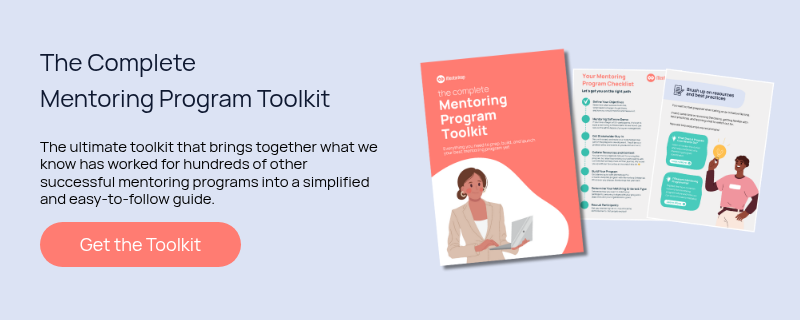It’s one of the questions we get asked most often: How do I find a mentor?
When people start reflecting on their goals and what’s next in their career or personal growth, many begin to wonder how they can take more control of their future. Inevitably, that leads to seeking out a mentor. But where should you start?
Well, your mentor may be closer than you think.
Too often, people come into the process with a very specific idea of who they want as their mentor, sometimes even picturing a “dream mentor” who feels out of reach. The problem with this approach is that it’s usually driven by perception, not practicality. The right mentor for you isn’t necessarily the most senior, most well-known, or most impressive person you can think of—it’s the person who can help you with what you need right now.
In this article, I want to not only to guide you on your path to finding a mentor but also give you ideas on how to spark a mentoring movement within your organisation. Exciting, isn’t it?
The Right Mentor for Right Now
First things first: let’s set aside any preconceived ideas about mentoring. Having a fresh and open perspective will allow you to think differently about what mentoring could look like for you and help you find the right match.
At Mentorloop, we encourage an outcome-driven approach to mentor matching. As a mentee, think about the specific goal or outcome you’re looking to achieve and use that as your starting point. It’s about finding the best person to help you get from point A to point B. And when you move on to point C? That might be someone else entirely.
Using your goal to guide the match is the first step in creating a successful and impactful mentoring relationship.
Look Within Your Existing Network – Don’t Ask a Stranger
There’s a common belief that a mentor is a kind of guardian angel you haven’t met yet. The truth is, 99 times out of 100, a complete stranger has no interest in solving your problem. Think of it like dating: if you rang up a stranger and asked them out, odds are the answer would be no (and it might even come off as a little creepy). The same goes for mentorship. It works better if there’s some warmth and familiarity.
That’s why your first step should be to look within your existing networks: your workplace, industry contacts, alumni groups, or professional associations. Even if you don’t know the person directly, a warm introduction through a mutual connection makes the proposition much more compelling than a cold outreach.
And remember, always tie your ask back to what you’re trying to achieve. Having a shared context (such as working at the same company or being part of the same association) makes your request reasonable, relevant, and hard to turn down.
Don’t Proposition – Do Your Research
So you’ve identified someone who has the experience or insights you need—how do you ask them to mentor you?
Do your homework. Understand their expertise and why it’s relevant to your situation. Then craft your approach with a clear and purposeful intent. This shows that you’ve thought about your problem carefully and that your request is meaningful, not random.
Here’s an example:
Hi Mike,
We’ve crossed paths a couple of times, and I’ve always admired how you’ve navigated the internal landscape at XYZ Co. Recently, I’ve been reflecting on my future here and how I can continue to contribute meaningfully. While I’ve enjoyed my time in the Blue Division, I’m curious about learning more about the Yellow Division and how my skills might transfer across.
Since you’ve gone through this experience yourself, I’d love to buy you a coffee and hear your perspective.
Regards,
Sue
This kind of specific, respectful request, especially when tied to a clear outcome, becomes very hard to say no to.
Put a Time Frame on It
Everyone is busy, and your potential mentor likely already has commitments (possibly even other mentees). To increase the chance of a “yes,” make the time frame clear.
You don’t need to meet weekly for a year to achieve your goal. Often, 3–4 conversations with a tight agenda can be enough to get you from A to B. When you give your mentor clarity and closure up front, you make it much easier for them to commit.
Don’t Just Look Up – Look Sideways
Some of the most impactful mentors aren’t senior leaders, they’re peers.
Peer mentoring can be just as powerful as traditional top-down mentoring. A colleague at a similar career stage, or just slightly ahead, may have the exact insights or lived experience you need. Plus, it creates opportunities for reciprocity: you can support each other by sharing unique perspectives, networks, or skills.
So don’t only look upwards in the hierarchy. Look sideways and think about how you can build a circle of support with peers.
Explore Existing Mentoring Programs
Before you start from scratch, check if there are already mentoring programs available to you. Many organisations, industries, and professional associations run structured programs designed to match mentors and mentees.
These programs can provide an easier and more transparent pathway to mentoring, helping you connect with people who are open and willing to participate. They also often come with guidance, resources, and structures that make the mentoring experience smoother for both parties.
Start a Mentoring Movement – Unlock Your Existing Talent
If you can’t find an existing program, think about proposing one within your workplace, association, or community. The appetite is often there, you just need someone to take the first step in making it happen. In fact, you could be the one to help kick things off!
By creating visibility of who is open to mentoring within your business or community, you unlock untapped talent and redeploy knowledge in outcome-driven mentorships. When people can see who’s available to connect, mentoring becomes less about cold outreach and more about warm, meaningful engagement.
At Mentorloop, we specialise in helping organisations do exactly this—unlocking their internal knowledge base and turning it into a mentoring movement that benefits everyone involved.
Ready to spark more mentoring opportunities where you are? Let’s unlock the power of mentoring together.





